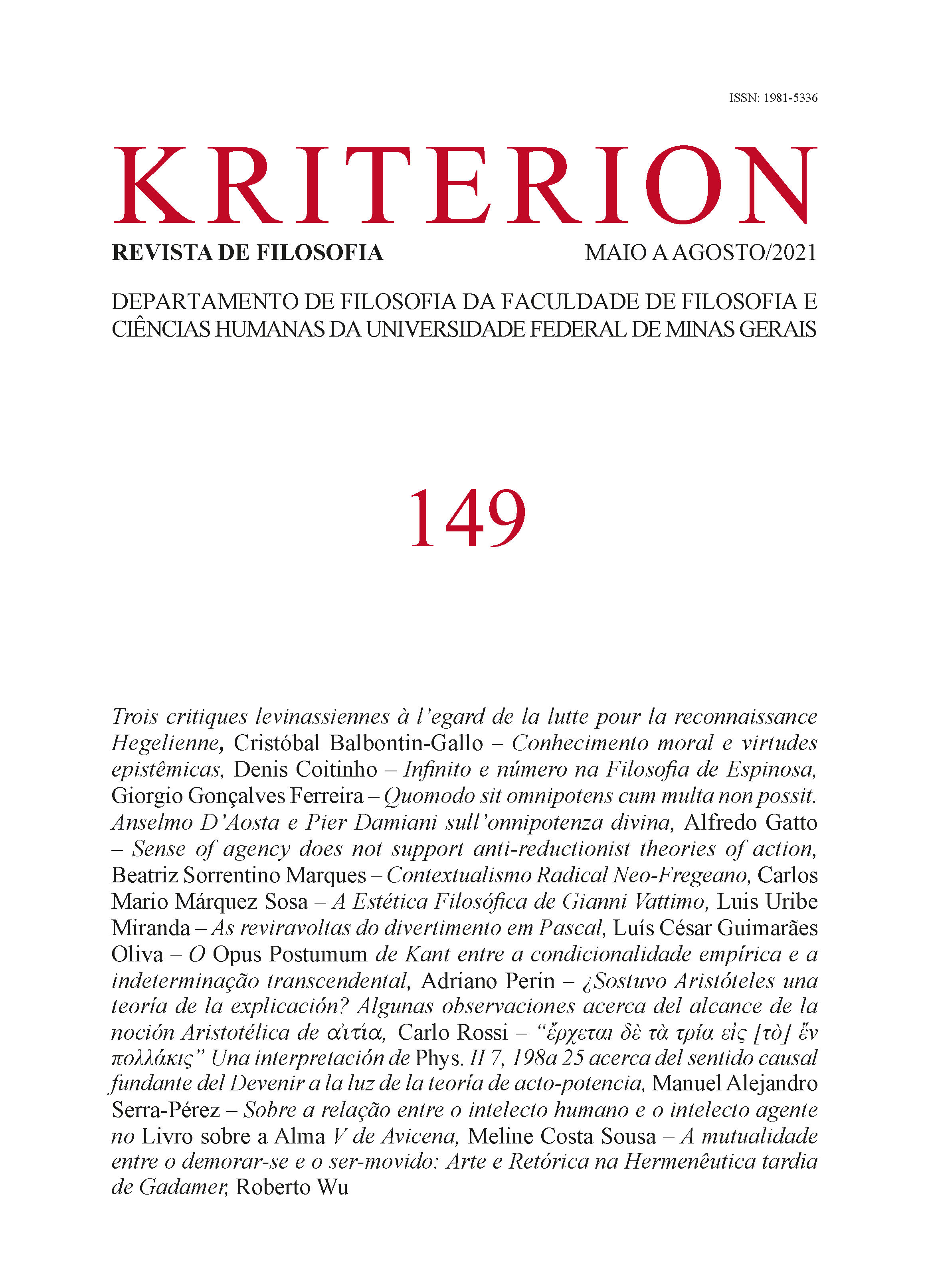MORAL KNOWLEDGE AND EPISTEMIC VIRTUES
Keywords:
Moral knowledge, epistemic virtues, practical wisdom, humility, integrityAbstract
The main aim of this paper is to reflect on the scope of moral knowledge from the virtue ethics model, which is based on the idea of virtuous character and human flourishing, and this approach seems very promising to respond to the skeptical argument that says that moral disagreement is an irrefutable proof of the impossibility of knowledge in the field of ethics. To this end, I begin by problematizing moral knowledge, with a specific consideration of ethical reasoning. Subsequently, I investigate the role of the epistemic virtues of practical wisdom, humility, and integrity for the acquisition of moral knowledge. Finally, I postulate that a virtue ethics that rely on certain epistemic virtues can explain adequately the moral knowledge and respond more effectively to skepticism.
Downloads
References
ANNAS, J. “Intelligent Virtue”. Oxford: Oxford University Press, 2011.
ARISTOTLE. “Nicomachean Ethics” (NE). Translation T. Irwin. 2a. Ed. Indianapolis: Hackett, 1999.
BOMMARITO, N. “Modesty and Humility”. Stanford Encyclopedia of Philosophy, 2018. Acessado em 25/09/2019.
BUCHANAN, A.; POWELL, R. “The Evolution of Moral Progress: A Biocultural Theory”. New York: Oxford University Press, 2018.
CALHOUN, C. “Standing for Something”. Journal of Philosophy, Vol. 92, Nr. 5, 1995, pp. 235-260.
CHISHOLM, R. “Perceiving: A Philosophical Study”. Ithaca, NY: Cornell University Press, 1957.
DePAUL, M. “Why Bother with Reflective Equilibrium?”. In: M. DePaul, W. Ramsey (eds.). Rethinking Intuition: The Psycology of Intuition and Its Role in Philosophical Inquiry. Lanham, Maryland: Rowman & Littlefield, 1998. pp. 293-310.
EINSTEIN, A. “The Ultimate Quotable Einstein”. Colleted and Edited by A. Calaprice. Princeton: Princeton University Press, 2010.
FISCHER, J.; RAVIZZA, M. “Responsibility and Control: A Theory of Moral Responsibility”. New York: Cambridge University Press, 1998.
GETTIER, E. “Is Justified True Belief Knowledge?”. Analysis, Vol. 23, Nr. 6, 1963, pp. 121-123.
GRECO, J. “Virtues and Vices of Virtue Epistemology”. Canadian Journal of Philosophy, Vol. 23, 1993, pp. 413-432.
HAMPSHIRE, S. “Fallacies in Moral Philosophy”. Mind, Vol. 58, Nr. 232, 1949, pp. 466-482.
LYNCH, M. “True to Life: Why Truth Matters”. Cambridge, MAS: MIT Press, 2005.
MACKIE, J. “Ethics: Inventing Right and Wrong”. London: Penguin Books, 1977.
McFALL, L. “Integrity”. Ethics, Vol. 98, Nr. 1, 1987, pp. 5-20.
McHUGH, C. “Epistemic Responsibility and Doxastic Agency”. Philosophical Issues, Vol. 23, 2013, pp. 132-157.
MILGRAM, S. “Behavioral Study of Obedience”. Journal of Abnormal and Social Psychology, Vol. 67, Nr. 4, 1963, pp. 371-378.
PLATO. “Five Dialogues: Euthyphro, Apology (Ap.), Crito (Cri.), Meno, Phaedo”. 2nd Ed. Translation G. M. A. Grube. Rev. J. Cooper. Indianapolis: Hackett Publishing Company, 2002.
ROBERTS, R. C.; WOOD, W. J. “Intellectual Virtues: An Essay in Regulative Epistemology”. New York: Oxford University Press, 2007.
ROBERTS, R. C.; WOOD, W. J. “Humility and Epistemic Goods”. In: M. DePaul, L. Zagzebski (eds.). Intellectual Virtue: Perspectives from Ethics and Epistemology. Oxford: Clarendon Press, 2012. pp. 257-279.
SCHERKOSKE, G. “Could Integrity be an Epistemic Virtue?”. International Journal of Philosophical Studies, Vol. 20, 2012, pp. 185-215.
SLOTE, M. “Goods and Virtues”. Oxford: Clarendon Press, 1983.
SMITH, A. “The Theory of Moral Sentiments” (TMS). D. D. Raphael, A. L. Macfie (eds.). Oxford: Oxford Universit Press, 1976.
SOSA, E. “A Virtue Epistemology: Apt Belief and Reflective Knowledge”, Vol. I. Oxford: Clarendon Press, 2007.
STEVENSON, C. “The Nature of Ethical Disagreement”. In: Facts and Values. New Haven: Yale University Press, 1963. pp. 1-9.
WILLIAMS, B. “A Critique of Utilitarianism”. In: J. J. C Smart, B. Williams (eds.). Utilitariasnism For and Against. Cambridge: Cambridge University Press, 1973. pp. 77-150.
ZAGZEBSKI, L. “Virtues of the Mind: An Inquiry into the Nature of Virtue and the Ethical Foundations of Knowledge”. Cambridge: Cambridge University Press, 1996.










